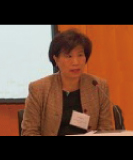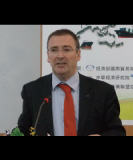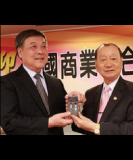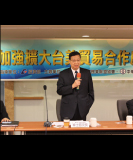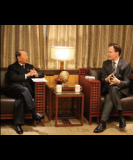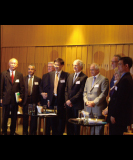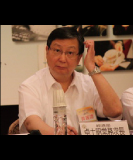You are browsing > Service in Taiwan > Development
DDG Wolff: WTO acceding governments reconfirm value of multilateral trading systemWTO
At a time when the WTO is under heightened scrutiny and reform of the WTO is a subject of concern for all, the efforts undertaken by acceding governments to join the organization are a force for change, Deputy Director-General Alan Wolff said on 29 June. Speaking at the virtual opening session of the WTO’s Accessions Week, DDG Wolff said that collective action and leadership are needed to meet global challenges and carry the multilateral trading system forward. Acceding governments “will help lead the way to the future,” he declared. The text of his speech is below.
--------------------------------------------------------------------------------------------
Thank you for the invitation to participate in this discussion of The Present and Future Value of WTO Membership.
There is no more important subject for the WTO today than to understand what its value is now and what it needs to be in the future.
The Current Value of the WTO
Before the creation of the multilateral trading system, international trade was conducted very substantially in a state of nature. Nations raised or lowered tariffs largely without international constraints. The average tariff level of the United States, under successive tariff acts, swung from 40.8% in 1909, to 27% in 1913, and back to 38.5 % in 1922. In retaliation for the last of these moves, the French government raised the tariff on automobiles from 45% to 100%. (1) Then, in 1930, the United States increased the average dutiable tariffs to just over 59%.(2) Dozens of countries responded with increased tariffs of their own. These actions deepened and lengthened the Great Depression.
During that period, the multilateral trading system did not exist. National freedom of action was nearly complete. The downside was that a nation’s trading partners could and did impose trade-restrictions in return. The attempts to save domestic production through protection proved to be a catastrophic failure. Thomas Hobbes described the life of man in the state of nature as “solitary, poor, nasty, brutish, and short”.(3) The situation for international commerce during the first half of the 20th century was at times not much better.
Today, 164 countries (including the EU and its constituent Member States) are WTO Members, and an additional 23 countries seek to join. No country’s prosperity is secure outside this system of rules. It is easy enough to assume that this is true only of middle-sized and smaller countries. Not so. Take any of the largest WTO Members and deprive it of the rule of law, and it could be subject to thousands of attacks on its commerce. Every country with which it traded could become a privateer, harassing its trade. A large former Member might think that it could rely on the unbounded leverage that it thinks that it has, but it might not even know why its commerce was suffering. There would be no requirement of transparency. No requirement of nondiscrimination. No open bidding for government procurement. No notification of proposed standards. No agreement to apply international standards to its exports of either manufactured goods or food. No prohibition of competing countries using export subsidies on manufactured goods and agricultural products to obtain market share at the expense of the hapless outcast.
Even the EU with about 77 bilateral agreements would find that these undertakings were not enough, that the multilateral trading system, upon which its bilateral agreements are based, was essential to its well-being. Absent the WTO, the EU, which is the world’s largest single market, would be poorer. As for the United Kingdom, BREXIT would never have even been an option for London were there no multilateral trading system consisting of enforceable rules for it to rely upon. In a state of nature, safety is sought above all other needs. Those who sleep outside the castle walls during a period of lawlessness do not sleep soundly.
The immutable rules for large and small countries alike are:
- Isolation means decline.
- Integration into the world economy means growth.
Since the multilateral trading system was launched, world trade has grown by about 30 times along with world GDP which in real terms is more than 20 times what it was in 1950. According to the World Bank’s World Development Indicators database, the total trade-to-GDP ratio for the world as a whole rose from roughly 25% in the 1960s to 60% in recent years. Based on an average of exports and imports, the ratio is still a healthy 30% compared with 12.5 % in the 1960s. The growth in the world economy, in standards of living, is inextricably linked with the expansion of world trade. It is not accidental that this growth occurred in the context of agreed rules provided by the multilateral trading system.
The value of being a WTO Member is wide-ranging. The Member’s goods are not to be discriminated against — at the border or within any other Member country. Tariffs are not to be imposed above negotiated rates. Regulations governing trade are to be made publicly available. An impressive amount of information necessary for businesses to understand and promote their commercial interests is to be available. Domestic support of agriculture is capped. Disputes are to be settled with the help of independent panels. The list of benefits is very long.
The value to a country of belonging to the system does not end with substantive rules. It also consists of procedural rights and justifiable expectations, among which are: The right to be heard; the right to participate in committees; the right to make proposals; the right to help to shape the rules; the right to choose who leads; the right to consultations; and a justifiable expectation to be supported in these endeavors by the WTO Secretariat.
A concrete example of the role of the WTO taken from the present is the activities undertaken during the COVID-19 pandemic. It is timely because it is current. It is particularly relevant because it is not based on theory or illusions. It does not oversell nor does it underestimate what the WTO at present is delivering.
When the pandemic struck, Members were urged by the WTO to notify their COVID-19-related measures promptly — both the measures facilitating trade and those limiting it. And the response from Members was good. The results were posted on the WTO website. In addition, a steady stream of information notes were published by the WTO Secretariat, and webinars were hosted to further explore subjects of interest to the Members. A General Council meeting of heads of delegation was called, via the web with remote participation, to determine how to handle meetings during the closure of the WTO building. Another session was called to discuss Members’ (and observers’) responses and concerns with respect to the pandemic.
Member countries have employed two broad types of measures: export restrictions and regulations to ease entry of imported medicines, personal protective equipment and medical equipment. As a result of belonging to the WTO, Members knew that their trade would not be discriminated against with respect to either category of measures, for either access to supplies or market access and, to my knowledge, this did not occur. Members had full information about the global availability of both stocks of food and the size of current crops. Many of the export restrictions on supplies of food were soon removed.
Once on-site presence could resume, coupled with secure remote access with simultaneous interpretation, which took a remarkably short time to put into place, WTO Members could meet and discuss their concerns in greater detail. At a meeting of the Committee on Sanitary and Phytosanitary (SPS) Measures on 24 June, Members stressed the importance of providing a coordinated response to global crises, ensuring that trade in agricultural and food products was not unduly restricted. The meeting began with a session dedicated to COVID-19 information-sharing. Members welcomed the extensive work of the WTO Secretariat in compiling SPS measures implemented since the start of the pandemic. They noted that almost half of these measures facilitate trade, with increased use of electronic certification.(4)
Groups of Members led by Singapore, New Zealand, Canada, Korea, and Switzerland announced measures that they were taking collectively. Within these groups, the level of firm commitments has grown with every announcement. Additionally, in some cases, observers (acceding countries) were explicitly issued a blanket invitation to join an initiative.
Why was not more done, as an immediate collective response, along the lines of the most forward-leaning collective efforts, such as were agreed to by Singapore with New Zealand? The WTO is a place for sovereigns to negotiate, not a world government. It has no executive branch. It decides fully multilateral matters, where all are to participate in the end result, by a committee of the whole. Over the WTO’s 25-year history, the one agreement in which all are expected to participate allowed for a large amount of self-determination. The Trade Facilitation Agreement (TFA) was well-suited to inclusion of Members of vastly different capabilities proceeding at different rates of speed in terms of their adherence implementation of the Agreement’s requirements. It is an extraordinarily positive achievement.
By easing the time and costs burdens, . . . the TFA is forecast to add up to 2.7% a year to world export growth and more than 0.5% a year to world GDP growth over the 2015-30 horizon. . . . [F]ull implementation of the TFA is estimated to boost [developing country] exports by 3.5% annually and augment their economic growth by 0.9% each year.(5)
It took some time to arrive at an agreement. The exploratory and analytical work on the TFA was launched in December 1996 at the first Ministerial Conference of the WTO. Negotiations were formally commenced following a decision in July 2004. Agreement was reached at the Bali Ministerial Conference in December 2013. Two-thirds of the signatories ratified by 22 February 2017 allowing the agreement to then go into effect, just over 20 years from when serious consideration of the matter began.
The Trade Facilitation Agreement was a Herculean endeavor to pave the way to lower trade costs at all the borders of nearly all nations. But that process is now very much underway. In contrast, the COVID-19 pandemic was not expected. There were no preparations for potential reactions by countries with respect to their trade. The last global pandemic occurred one hundred years ago. Major interventions by most governments to deal with the health risks began, although it seems longer, only three and a half months ago. Their first reactions were individual and national. At present, most Member governments still are primarily concerned with compelling domestic concerns — concentrating on the trade-offs involved in opening their economies while hoping to avoid sparking fresh outbreaks of the virus.
Member governments and authorities are having to deal with first and second waves of infection. Nevertheless, groups of WTO Members, subsets of the full Membership, have coalesced to consider how best to collectively shape their individual responses. Last week, a group of countries asked the Secretariat to engage in full monitoring and reporting of measures countries were taking that would affect trade in food, while committing themselves to an extensive list of policies that they believe would promote considered responses to the pandemic, minimizing any adverse impact on trade.
There will very likely be future pandemics. Global travel created a lightning-fast spread of the disease across the globe. The most directly relevant WTO rule, on export restrictions in short-supply situations, is not very prescriptive. There is no established WTO-agreed guidance on best practice, either with respect to imposing export restrictions during this sort of crisis, nor with respect to easing imports of needed supplies. The agreement on duty-free treatment for pharmaceuticals has not been updated for a decade and does not reflect current trade patterns. The coverage of the Information Technology Agreement, which has clearly relevant aspects for both dealing with the disease and the economic recovery, is five years old and the review slated for 2018 has not taken place. E-Commerce negotiations are well underway, but not yet concluded.
The various initiatives that have been tabled to deal with COVID-19, contain ideas that are being discussed among Members. A chief value of the WTO is that it is a place where this discussion can take place. It is where there are established common values, operating under a set of agreed principles. The discussion at the WTO of how to deal with crises like that now being experienced will not fade away.
The Future Value of WTO Membership
No one appreciates the real value of WTO membership more than those seeking to join the system, as they must negotiate their entry into the WTO. The path is not easy, although a number of countries’ representatives, the chairs and the Secretariat are there to assist. Market access and rules-based commitments are made follow years of negotiations. These commitments are usually deeper and more comprehensive than those undertaken by original Members.
The average bound rates of duty of the 36 Article XII Members (those countries acceding to the WTO after the WTO was founded) is no more than about one-third of that of original Members (13.9% vs 39.7%)(6). Similarly, in services, the number of specific commitments is much higher for Article XII Members — on average, 102 sub-sectors compared to 49 sub-sectors committed by the original Members. In the areas of rules, the commitments made by Article XII members are more specific, elaborated or expanded interpretations of rules as set out in the original WTO Agreements, which are referred to as “WTO-plus”.
The complexity associated with the level of commitments keeps increasing over the years, reflecting the evolving nature of the interests of the participants in the multilateral trading system. This also means that the costs of staying outside the system are increasing as the coverage of WTO rules and principles has already reached over 98% of world trade.
Evidence prepared by the WTO Economic Research and Statistics Division shows that the greater commitments of Article XII Members had a significant positive effect on their economic growth. In particular, acceding WTO Members that have made deeper commitments have experienced, on average, a 15% larger and a longer sustained period of economic growth than acceding WTO Members having made fewer commitments. This positive impact on economic growth is even observed in the two years preceding Article XII Members' accession, highlighting the important role of economic reforms during their accession process. A key benefit of the WTO process is, in fact, that it contributes to and helps drive domestic reforms through the adoption of international best practices.
Since the establishment of the WTO in 1995, 36 members have joined the WTO, using the accession process as a vehicle to transform their economies, including centrally planned economies becoming more market more oriented (e.g. former Soviet Republics, China, Vietnam); from narrowly-based to more diversified (e.g. commodity-based economies such as Saudi Arabia, or island economies in the Pacific); or from more fragile to less, as rules-based economies (e.g. Cambodia, Afghanistan, Liberia). Today, the 23 acceding governments in the queue utilize WTO membership as a key driver for reforms and economic growth.
WTO accessions are in the vanguard of WTO reform because accession negotiations often stimulate rule-making discussions at the multilateral level. One key lesson from these accessions is that the WTO rule-book needs to continue to evolve to meet the global trade aspirations and requirements of all economies in the 21st century.
Concluding Remarks
WTO reform is a subject of concern to current members as well as acceding governments. Due in part to the pandemic, where there have been expectations that have not been yet met, the WTO is receiving heightened scrutiny. Were the WTO Members to join together to meet the trade challenges of the coronavirus and the desperately needed economic recovery, public criticisms of the WTO would likely be substantially diminished. But the problems being experienced preceded the pandemic and will, absent more fundamental reforms, persist after the pandemic is over and its after-effects have been addressed.
The testing of the WTO is far from over. There will always be challenges. Collective action is essential if global challenges are to be met. Leadership is necessary to carry the system forward and for it to function well. Acceding governments, which are future Members, are not only by their presence reconfirming the value of the multilateral trading system but they also are a force for change. Through acceding, they will help lead the way to the future.
Acceding countries’ negotiators deserve special recognition. They must not only be intimately familiar with the rights and obligations of becoming a WTO Member, but also must understand in detail their countries’ own economies in every significant area where trade touches it. Participating in accession is a benefit on its own. It is not just the destination but the journey that is to be prized.
Thank you.
Notes:
- https://eh.net/encyclopedia/the-fordney-mccumber-tariff-of-1922/
- https://en.wikipedia.org/wiki/Smoot
- Thomas Hobbes, Leviathan, i. xiii. 9.
- https://www.wto.org/english/news_e/news20_e/sps_24jun20_e.htm
- https://www.wto.org/english/tratop_e/tradfa_e/tradfa_introduction_e.htm
- In AG, the average bound duties of Article XII members and the original members are 20.5% and 65.5%, respectively, while in Non-AG, they are 12.9% and 33.9%, respectively.

